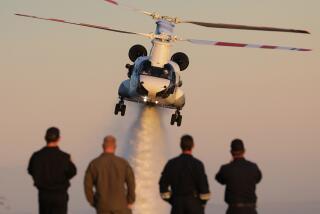Firefighting Planes Are Grounded
- Share via
BOISE, Idaho — The Forest Service has permanently grounded 11 air tankers and temporarily grounded other planes used to fight wildfires after an expert panel said the aerial firefighting program is unsafe and plagued with problems.
The panel’s report released Friday was prompted by the deaths of six fire crew members in two tanker crashes and a helicopter crash earlier this year.
The permanently grounded planes carry too high a risk to use, said Forest Service Fire Director Jerry Williams, and a long-term solution could mean building planes specifically for fighting wildfires, at a cost of $20 million each.
The grounded tankers were all C-130A or PB4Y-2 models used under contract with private companies. They delivered about 10% of the water and foam dropped on wildfires.
Nineteen government-owned P-58 lead planes and four Sherpa Smokejumper aircraft were grounded pending evaluation of safety issues identified in the experts’ report.
The remaining 33 air tankers must pass a rigorous inspection and follow a new maintenance program before they are returned to duty, Williams said. Those air tankers are government-owned or -leased or have structural differences from the grounded planes.
“We are going to reduce public and employee exposure to what we perceive as high-risk aircraft,” Williams said. “The contractors did not identify structural problems.”
During next year’s fire season, more helicopters could be used and military planes may be called in if the fleet runs short, Williams said.
The expert panel, appointed by the federal government, found the aerial firefighting program had a pass-the-buck approach to safety standards, inadequate training, lacked communication between agencies and focused on compliance rather than safety.
In August, Forest Service Chief Dale Bosworth and BLM Director Kathy Clarke enlisted the aviation experts, led by former National Transportation Safety Board Chairman Jim Hall and Texas state forester Jim Hull, to study the issue.
The report faulted the Federal Aviation Administration for leaving to contractors the certification and inspection of the aircraft, many of which are modified World War II military tankers.
“The FAA apparently sees no statutory requirement to oversee airworthiness,” said William Scott, panel member and bureau chief for Aviation Week and Space Technology Magazine. “This creates a dangerous situation.”
But Allen Kenitzer, FAA spokesman in Seattle, said the administration is not authorized by Congress to set standards for aircraft used by the government.
More to Read
Sign up for Essential California
The most important California stories and recommendations in your inbox every morning.
You may occasionally receive promotional content from the Los Angeles Times.













